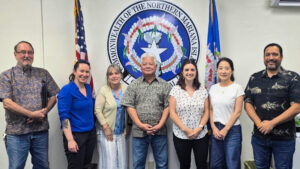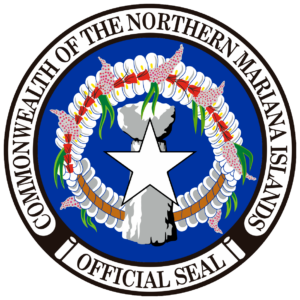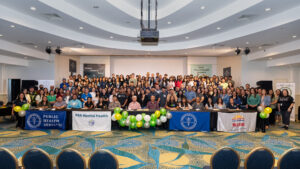What is Pandemic Unemployment Assistance (PUA)?
On March 27, 2020, the President signed into law the Coronavirus Aid, Relief, and Economic Security (CARES) Act of 2020, which includes the Relief for Workers Affected by Coronavirus Act set out in Title II, Subtitle A. Section 2102 of the CARES Act creates the new temporary Pandemic Unemployment Assistance (PUA) program. The PUA program provides temporary benefits to individuals whose employment or self-employment has been lost or interrupted as a direct result of COVID-19. Direct result means loss of employment or self-employment because of a reason directly related to the COVID-19 Pandemic. The PUA program, in general, provides up to 39 weeks of unemployment benefits. The U.S. Department of Labor (Department) oversees the PUA program and reimburses the CNMI Department of Labor for both the program administration and benefit payment costs.
For more information on the PUA program, please review
Unemployment Insurance Program Letter (UIPL) No. 16-20:
https://wdr.doleta.gov/directives/corr_doc.cfm?docn=4628
Qualifying for PUA
PUA provides benefits to individuals who are not eligible for regular unemployment compensation (UC) or extended benefits (EB) under state or Federal law or pandemic emergency unemployment compensation (PEUC), including those who have exhausted all rights to such benefits. Covered individuals also include the self-employed, those seeking part-time employment, individuals lacking sufficient work history, and those who otherwise do not qualify for regular UC or EB under state or Federal law or PEUC. Except as otherwise provided in Section 2102 of the Act, or to the extent there is a conflict between Section 2102 and 20 C.F.R. Part 625, the Disaster Unemployment Assistance (DUA) regulations at 20 CFR Part 625 apply to the PUA program, as if the term “COVID–19 public health emergency” were substituted for the term “major disaster” and the term “pandemic” were substituted for the term “disaster” each place it appears in 20 C.F.R. Part 625.
PUA is also generally not payable to individuals who have the ability to telework with pay or who are receiving paid sick leave or other paid leave benefits. However, individuals receiving paid sick leave or other paid leave benefits for less than their customary work week and individuals who have been offered the option of teleworking with pay who then work less than the individual worked prior to the COVID-19 pandemic, may still be eligible for PUA. However, income received for telework, and the income reductions listed in the DUA regulations at 20 C.F.R. 625.13 received in a week must be deducted from the PUA benefit payment for that week, including paid sick leave.
In general, PUA provides benefits to qualifying individuals who are otherwise able to work and available for work within the meaning of the applicable state UC law, except that they are unemployed, partially unemployed, or unable or unavailable to work due to one of the COVID-19 related reasons identified in Section 2102(a)(3)(A)(ii)(I) of the CARES Act and listed below:
- The individual has been diagnosed with COVID-19 or is experiencing symptoms of COVID-19 and is seeking a medical diagnosis;
- A member of the individual’s household has been diagnosed with COVID-19;
- The individual is providing care for a family member or a member of the individual’s household who has been diagnosed with COVID-19;
- A child or other person in the household for which the individual has primary caregiving responsibility is unable to attend school or another facility that is closed as a direct result of the COVID-19 public health emergency and such school or facility care is required for the individual to work;
- The individual is unable to reach the place of employment because of a quarantine imposed as a direct result of the COVID-19 public health emergency;
- The individual is unable to reach the place of employment because the individual has been advised by a health care provider to self-quarantine due to concerns related to COVID-19;
- The individual was scheduled to commence employment and does not have a job or is unable to reach the job as a direct result of the COVID-19 public health emergency;
- The individual has become the breadwinner or major support for a household because the head of the household has died as a direct result of COVID-19;
- The individual has to quit his or her job as a direct result of COVID-19; or
- The individual’s place of employment is closed as a direct result of the COVID-19 public health emergency.
Filing a PUA Claim
The CNMI Department of Labor will issue instructions via the DOL website, press releases, and other media once the guidance is finalized with the U.S. Department of Labor. The CNMI DOL will also announce telephone lines that will be dedicated to assist with questions regarding the PUA program.
Continued Benefit Payments
After filing a PUA application, an individual must request continued PUA benefit payments according to the instructions given by the CNMI Department of Labor.
Required Proof of Employment
The individual will need to provide proof (e.g., paystubs, income tax return, bank statements, job offer letter) to document employment or self-employment that was impacted by COVID-19 or to document work that was to begin on or after the date when COVID-19 impacted the individual’s employment status. Individuals will follow the applicable CNMI Department of Labor requirements for submitting the required documentation.
Federal Pandemic Unemployment Compensation (FPUC)
Individuals who receive at least one dollar ($1) of PUA benefits for a week, will also receive an additional $600 supplemental payment under the FPUC program described at section 2104 of the CARES Act. See also UIPL No. 15-20, https://wdr.doleta.gov/directives/corr_doc.cfm?DOCN=9297. However, the time period that a claimant can receive the FPUC supplemental payment is more limited than the duration of the PUA payments. Specifically, FPUC is payable only for weeks of unemployment beginning on or after the date on which the state (50 States, the District of Columbia, the Commonwealth of Puerto Rico, and the U.S. Virgin Islands) enters into an FPUC agreement with the Department. For the Commonwealth of the Northern Mariana Islands (CNMI), Guam, American Samoa, the Federated States of Micronesia (FSM), the Republic of the Marshall Islands, and the Republic of Palau, FPUC is payable only for weeks of unemployment beginning on or after the date on which the entity enters into a PUA agreement with the Department (March 29, 2020). FPUC is not payable to any individual for any week of unemployment ending after July 31, 2020.
Benefit Duration and Weekly Benefit Amount (WBA)
PUA is payable beginning on or after January 27, 2020 and ending on or before December 31, 2020. The duration of PUA benefits payable to an individual is generally limited to 39 weeks.
CNMI and Guam follow a PUA WBA calculation of the average of the payments of regular compensation made under all State laws referred to in 20 CFR 625.2(r)(1)(i), as published in Unemployment Insurance Program Letter No. 03-20. American Samoa, FSM, the Republic of the Marshall Islands and the Republic of Palau follow a PUA WBA calculation found in 20 CFR 625.6(d). The PUA WBAs for the CNMI is up to $345 per week.
Appeals
Any denial of PUA benefits may be appealed. Individuals will follow the CNMI Department of Labor instructions concerning appeal rights and deadlines for timely filing of appeals. More information on appeals are forthcoming.
Stay Updated
Residents are advised to continue following updates regarding the Pandemic Unemployment Assistance (PUA) and the Federal Pandemic Unemployment Compensation (FPUC) program through press releases and announcements from the CNMI Office of the Governor and the CNMI Department of Labor.
# # #





